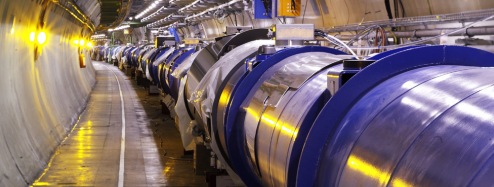
The first beam in the Large Hadron Collider at CERN was successfully steered around the full 27 kilometres of the world’s most powerful particle accelerator at 10h28 this morning. This historic event marks a key moment in the transition from over two decades of preparation to a new era of scientific discovery.
“It’s a fantastic moment,” said LHC project leader Lyn Evans, “we can now look forward to a new era of understanding about the origins and evolution of the universe.”
Starting up a major new particle accelerator takes much more than flipping a switch. Thousands of individual elements have to work in harmony, timings have to be synchronized to under a billionth of a second, and beams finer than a human hair have to be brought into head-on collision. Today’s success puts a tick next to the first of those steps, and over the next few weeks, as the LHC’s operators gain experience and confidence with the new machine, the machine’s acceleration systems will be brought into play, and the beams will be brought into collision to allow the research programme to begin.
“The LHC is a discovery machine,” said CERN Director General Robert Aymar, “its research programme has the potential to change our view of the Universe profoundly, continuing a tradition of human curiosity that’s as old as mankind itself.”
Tributes have been coming in from laboratories around the world that have contributed to today’s success.
“The completion of the LHC marks the start of a revolution in particle physics,” said Pier Oddone, Director of the US Fermilab. “We commend CERN and its member countries for creating the foundation for many nations to come together in this magnificent enterprise. We appreciate the support that DOE and NSF have provided throughout the LHC's construction. We in the US are proud to have contributed to the accelerator and detectors at the LHC, together with thousands of colleagues around the world with whom we share this quest.”
“As some might say: ‘One short trip for a proton, but one giant leap for mankind!’ TRIUMF, and indeed all of Canada, is delighted to bear witness to this amazing feat,” said Nigel S. Lockyer, Director of Canada’s TRIUMF laboratory. “Everyone has been involved but CERN is to be especially congratulated for bringing the world together to embark on such an incredible adventure.”
--CERN Press Release See TRIUMF news release for more information
For Canadian news coverage, please see Canad.com.
